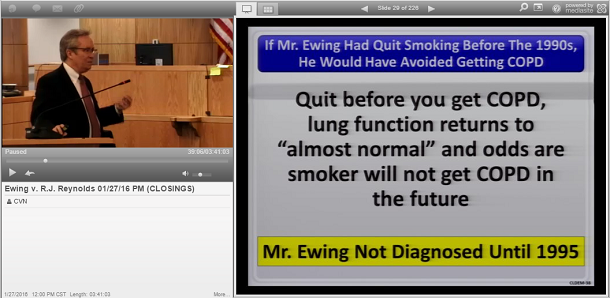
Mark Belasic delivers closing arguments on behalf of R.J. Reynolds in Doris Ewing's suit against Reynolds and Philip Morris for the respiratory disease and death of her husband, James "J.R." Ewing. Jurors awarded $240,000 in damages against Reynolds, but found James Ewing 98% responsible for his COPD and absolved Philip Morris of any liability.
Pensacola,FL—A jury Thursday largely cleared the nation’s two largest cigarette manufacturers of responsibility for the respiratory disease and death of a decades-long smoker, awarding $240,000 in unreduced damages but finding the smoker 98% at fault. Ewing v. R.J. Reynolds, 2009-CA-002791.
Jurors found James “J.R.” Ewing’s nicotine addiction caused his chronic obstructive pulmonary disease, or COPD, but determined the disease did not cause Ewing’s death in 2009. And while jurors concluded R.J. Reynolds cigarettes were responsible for Ewing’s COPD, they completely absolved Philip Morris of liability.
Ewing, who worked as an industrial electrician, smoked up to two packs of cigarettes a day for 50 years, continuing to smoke even after he was diagnosed with COPD. He died in 2009, 14 years after the diagnosis. His wife, Doris Ewing claims Reynolds and Philip Morris, makers of cigarettes her husband smoked, caused his respiratory disease and death by hiding the dangers and addictiveness of cigarettes for more than four decades.
Thursday’s decision apportioned only 2 percent of responsibility for Ewing’s COPD to Reynolds and found neither defendant liable on conspiracy or concealment claims. Because of those findings and the jury’s refusal to award punitive damages, the $240,000 compensatory award will likely be reduced to $4,800.
Doris Ewing’s attorney, Richard Diaz, of the Law Offices of Richard J. Diaz, had requested $10 million in compensatories plus unspecified punitives in Wednesday’s closing arguments.
The Ewing case is one of thousands of similar Florida lawsuits against the nation's tobacco companies. Those cases stem from Engle v. Liggett Group, a 1994 class action claim involving Florida smokers. A jury in that case found tobacco companies knowingly produced dangerous, addictive cigarettes and hid those dangers from the public. The Florida Supreme Court decertified the class on appeal, but its ruling allows individual plaintiffs to rely on the jury’s conclusions in the original trial if they can prove the smokers at the center of their cases suffered a smoking-related disease caused by an addiction to cigarettes.
The link between nicotine addiction and Ewing’s COPD served as a central point of dispute in the case. Diaz claims Ewing started smoking as a teenager, lured by marketing from a tobacco industry that glamorized cigarettes while knowingly manufacturing an addictive product. By the time Ewing learned the dangers of cigarettes, Diaz claims Ewing was hopelessly addicted and unable to completely quit smoking, even as his respiratory disease progressed.
During Wednesday’s closings, Diaz detailed Ewing’s attemts to quit or reduce his smoking and reminded jurors one expert felt Ewing was so addicted he would never have been able to completely give up cigarettes.
“Folks there’s no question in this case that Mr. Ewing was not only addicted to nicotine in cigarettes, he was heavily, heavily addicted,” Diaz said during closings. “If 3-4 packs per day, or 2-4 packs per day, for 40 or 50 years is not addiction; if you keep smoking after you’ve tried all these quit attempts and you’re unsuccessful; if you keep picking one up, after the other, after the other, after the other; if you’re having serious withdrawals, you’re addicted.
“If this isn’t addiction, folks, addiction doesn’t exist,” Diaz said.
The defense countered Ewing knew the dangers of smoking but was never interested in completely quitting. During Wednesday’s closings, Jones Day’s Mark Belasic, representing R.J. Reynolds, reminded jurors of records describing Ewing as being unreceptive to recommendations he quit and refusing smoking cessation counseling. “Now that’s not some tobacco company lawyer argument,” Belasic said. “This is what his doctors are writing in his own record: ‘He declines to quit.’”
Belasic also argued the fact that Ewing successfully cut back on his smoking showed that he could have quit completely if he wanted. “When I asked the cessation counselors, they agreed, he wasn’t motivated to get to zero. He could cut down, he had the ability,” Belasic said. “But he didn’t want to quit.”
Beck Redden’s Kathleen Gallagher, representing Philip Morris, added that, regardless of whether Ewing was addicted, there was insufficient evidence Ewing smoked Philip Morris’ Marlboro brand family long enough to link the company’s cigarettes to his illness.
Gallagher noted surveys showed Ewing smoked several different brands of cigarettes, including brands not made by Philip Morris, at the time he was allegedly smoking Marlboros. “You can’t make (a causal link) up, you can’t fill in gaps, you can’t say, ‘Well I think this is what happened.' You have to have evidence to support it,” Gallagher told the jury. “And if the evidence doesn’t support that this brand of cigarettes led to his COPD or death, then you have to answer no to that (jury verdict) question.”
Beyond Engle class membership issues, Ewing’s cause of death played a central role in the trial, with parties sparring over whether smoking-related COPD ultimately killed Ewing.
During Wednesday’s closings, Diaz noted COPD was listed as one of three causes of death on Ewing’s death certificate, and reminded jurors three medical experts, including Ewing’s attending physician at the time of his death, Dr. Robert Flurry, testified COPD contributed to Ewing's death. “This man died from COPD,” Diaz said. “We brought you an avalanche of evidence to meet our burden.”
However, the defense argued errors on the death certificate and the lack of an autopsy cast doubt on Ewing’s true cause of death. During Wednesday’s closings, Jones Day’s Dennis Murphy, representing Reynolds, noted Ewing’s death certificate incorrectly listed “acute myocardial infarction,” or heart attack, as one of his causes of death. Murphy argued Flurry acknowledged the forms were sometimes not completely accurate. “(Flurry) said his cause of death, what he listed, that that was a guestimate. Again, that’s (Flurry’s) word,” Murphy said. “So how are you going to rely on the death certificate when that is what the man who filled it out said?”
Neither the parties’ attorneys nor the tobacco companies’ representatives could immediately be reached for comment.
Email Arlin Crisco at acrisco@cvn.com.
Related Information
Richard Diaz, of The Law Offices of Richard J. Diaz, represents Doris Ewing.
Mark Belasic and Dennis Murphy, of Jones Day, represent R.J. Reynolds.
Kathleen Gallagher, of Beck Redden, represents Philip Morris.
Watch Ewing v. R.J. Reynolds and Philip Morris on demand.
Not a subscriber?
Learn more about CVN's unrivaled tobacco litigation library.





